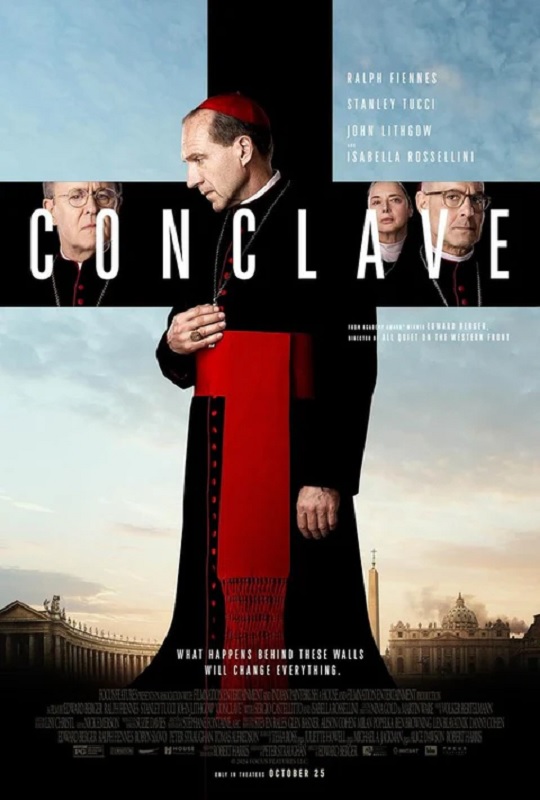

2024 – Conclave
I thoroughly enjoyed this movie. If for no other reason than that it was somewhat educational. I’m not a Catholic, and it offered a fictionalized account of what happens when it time to elect a new Pope. In that way, it reminded me, just a little, of the wonderful 1959 film, The Nun’s Story, which starred Audrey Hepburn. Granted it was fictionalized, and I’m sure reality is a bit different, probably without the politicking and drama… perhaps. But was interesting to watch the process as it was presented in the movie.
But the better part of the movie was the incredible cast, headed by Ralph Fiennes as Cardinal Thomas Lawrence, Dean of the College of Cardinals. When the Pope dies, it is his duty to administer the Conclave and make sure all procedures go smoothly. But his task is complicated by ambitious and scheming Cardinals who want the position for themselves, and a mysterious Cardinal who was appointed in secret, who shows up to cast his own vote for the next Holy Father.
The entire cast was good, but Fiennes was incredible. Cardinal Lawrence had no desire to become Pope, knowing that he was having a crisis of faith, and even wishing to step down as Dean. Fiennes wore a cloak of humility and piousness that seemed to fit him. He portrayed the character as reluctant to take place in the politics of the assembled Cardinals. And he handled all the difficulties of the Conclave with both gentleness and authority. Fiennes was wonderful.
Among the top candidates, there was the corrupt Cardinal Tremblay, played by John Lithgow. He had actually been sacked by the dead Pope, because he’d collected evidence against Tremblay, proving that he had paid other Cardinals for their votes. Lithgow always turns in a good performance, no matter what role he takes on. Another was Lucian Masamati as Cardinal Adeyemi, a perfectly good candidate, who is maliciously discredited by Tremblay. Lawrence’s favored candidate is Cardinal Bellini, played by Stanley Tucci. He is an extremely liberal American Cardinal who is the early favorite, though when voting begins, he receives very few votes. Fourth is a staunch traditionalist who wants to go to war with Islamic terrorists, and take the Church back into the dark ages.
And finally there is the mysterious secret Archbishop Vincent Benitez of Kabul. He has lived through wars and strife, and has a different perspective on the world that is portrayed as purer and nobler. He wants the church to focus on love instead of hate. He is removed from the politics of the Conclave. But he also has a secret that further sets him apart from his colleagues.
Unexpectedly, it is Archbishop Benitez who is elevated to the position of Pope, and in the final scene of the movie, his secret is revealed. He was a man who was born with ovaries and a uterus, which were only discovered when he was an adult. But rather than having them surgically removed, he chose to remain as God had made him. How’s that for a twist ending? Father Lawrence learns the secret and chooses to keep it. And I thought to myself, who cares? He is a good man and the Conclave made the right decision.
And lest I forget the nun in charge of catering and housekeeping, Sister Agnes, was played by Isabella Rossellini, who I have always loved. She had a small but pivotal role in the narrative, and she brought both an authority and at the same time a sense of humble deference to the role. She played it beautifully.
The sets and the costumes were beautiful, though throughout much of the film, nearly everyone wore the same cassock with a zucchetto or sometimes a biretta. Every so often, there would be a chasuble or some other form of priestly dress. It was appropriate and the uniformity looked good on the screen. The apartments of the Pope and the voting space, otherwise known as the Sistine Chapel, looked gorgeous. I was surprised with a terrorist suicide bombing damaged the Chapel, causing a window to be blown in, showering the gathering of Cardinals with shards of glass and plaster dust.
It was a movie that had an admirable message. First, it said that humans, even church officials and Popes, are flawed, and that’s ok. More than that, if shortcomings are mitigated by true repentance, they can be met with sincere forgiveness, and that’s ok, too. Second, it really promoted the idea that neither corrupt politics nor hate have a place in true service to Christ. I like that idea very much. A pope should be driven by faith and service to God, not by personal ambition. The Catholic Church should lead by men and women with love for all humanity, not just love for those who believe the same things they do. This movie a pleasure to watch. The acting was phenomenal, and the drama was engaging. The dialogue was smart and the messages were on-point. And I’m not surprised that Fiennes was nominated for Best Actor for his work, though he didn’t win. The pacing was good and the directing by Edward Berger was excellent. This is one I would definitely watch again.








